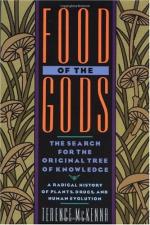|
This section contains 512 words (approx. 2 pages at 400 words per page) |

|
Complacencies of the Peignor: Sugar, Coffee, Tea and Chocolate Summary and Analysis
McKenna argues that in prehistoric times, when food resources dwindled, our ancestors had to try other products in the environment as sources of food, and there was evolutionary pressure for animals with broader definitions of taste. Acquiring a new taste is both psychological and biochemical; it requires adding new behaviors as well as new digestion processes.
The lack of chemical stimulation and drug scarcity, particularly in Medieval Europe, paved the way for mania surrounding dyes and spices. These were the closest replacements for excitement and variety - and encouraged much of the shipbuilding, traveling and trade during this time. McKenna postulates that the Christian Middle Ages, rife with moral rectitude and sexual repression, ended because the spice trade routes enabled access to new and exotic...
(read more from the Complacencies of the Peignor: Sugar, Coffee, Tea and Chocolate Summary)
|
This section contains 512 words (approx. 2 pages at 400 words per page) |

|




